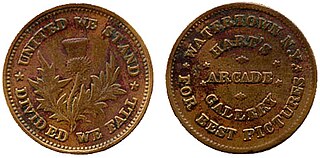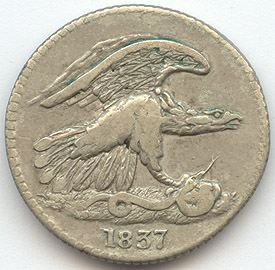 W
WIn numismatics, token coins or trade tokens are coin-like objects used instead of coins. The field of token coins is part of exonumia and token coins are token money. Tokens have a denomination either shown or implied by size, color or shape. "Tokens" are often made of cheaper metals: copper, pewter, aluminium, brass and tin were commonly used, while bakelite, leather, porcelain, and other less durable materials are also known.
 W
WLas arras, or las arras matrimoniales are wedding paraphernalia used in Christian wedding ceremonies in Spain, Latin American countries, and the Philippines. The tradition is also followed, with varying names and customs, in other countries and communities bearing degrees of Hispanic influence. Traditionally, in Spain and Latin America, it is made up of thirteen gold coins presented in an ornate box or chest; in the Philippines, it is in an ornate basket or pouch. After being blessed by a priest, they are given or presented by the groom to the bride.
 W
WA bakery token is a form of commercial token sold by and used in bakeries in the United States and postconfederation Canada primarily in the late 19th and early 20th century. The tokens, usually made of brass, copper or aluminum, were given in lieu of change as a way of encouraging customers to return to the store. They were also given to suppliers in smaller locations as partial payments. They came in denominations of 1/2, 1, and 2 loaf.
 W
WCivil War tokens are token coins that were privately minted and distributed in the United States between 1861 and 1864. They were used mainly in the Northeast and Midwest. The widespread use of the tokens was a result of the scarcity of government-issued cents during the Civil War.
 W
WA communion token is a metal token issued to members of Reformed churches in order to provide them entrance to the Lord's Supper. There were many types issued in Scotland in the 18th and 19th centuries, but they were largely superseded by communion cards.
 W
WConder tokens, also known as 18th-century provincial tokens, were a form of privately minted token coinage struck and used during the latter part of the 18th century and the early part of the 19th century in England, Anglesey and Wales, Scotland, and Ireland.
 W
WThe Feuchtwanger Cent was a "German Silver" private token coin circulated by Lewis Feuchtwanger during the 1830-1840s in the U.S. Three cent varieties were also available, though not as plentiful as the one cent tokens.
 W
WA geocoin is a metal or wooden token minted in similar fashion to a medallion, token coin, military challenge coin or wooden nickel, for use in geocaching, specifically as form of a calling card. The first geocoins were developed by Jon Stanley as a signature item to be placed in caches.
 W
WGettone means "token" in Italian. More specifically, the word gettone can be used to refer to the gettone telefonico, which was used during much of the 20th century in Italian phone booths.
 W
WHard-times tokens are American large or half cent-sized copper tokens, struck from about 1833 through 1843, serving as unofficial currency. These privately made pieces, comprising merchant, political and satirical pieces, were used during a time of political and financial crisis in the United States.
 W
WJetons or jettons are tokens or coin-like medals produced across Europe from the 13th through the 18th centuries. They were produced as counters for use in calculation on a counting board, a lined board similar to an abacus. They also found use as a money substitute in games, similar to modern casino chips or poker chips.
 W
WThe Magdalen Island penny token was a token that was originally issued for use on that island and throughout Lower Canada and the Maritime Provinces in the early 19th century. This token was issued in 1815 by Sir Isaac Coffin, who was granted the island by the British government in reward for his loyalty to the crown during the American Revolutionary War. While not a rare coin, it is hard to find in anything but worn condition, and even prices for pieces in the lowest grades tend to start at about at about C$100 and go up rapidly from there.
 W
WThe Office of Price Administration (OPA) was established within the Office for Emergency Management of the United States government by Executive Order 8875 on August 28, 1941. The functions of the OPA were originally to control money and rents after the outbreak of World War II.
 W
WOregon Centennial Tokens were a type of trade token issued during the 1959 Oregon Centennial. Many localities sold them as a fundraiser to finance their Centennial celebrations.
 W
WSales tax tokens were fractional cent devices used to pay sales tax on very small purchases in many American states during the years of the Great Depression. Tax tokens were created as a means for consumers to avoid being "overcharged" by having to pay a full penny tax on purchases of 5 or 10 cents. Issued by private firms, by municipalities, and by twelve state governments, sales tax tokens were generally issued in multiples of 1 mill.
 W
WA sobriety coin is a token given to Alcoholics Anonymous or other 12 step group members representing the amount of time the member has remained sober. It is traditionally a medallion the size of a poker chip 33 mm (Standard) or 34 mm in diameter marking the sobriety time achieved, awarded for abstaining from alcohol while with the program. In other 12 step programs it is to mark time abstaining from whatever the recipient is staying away from. There is no official AA medallion or chip; they are used in AA culture but not officially Conference Approved, and the AA logo has not been granted for use on medallions.
 W
WIn the United States, a wooden nickel is a wooden token coin, usually issued by a merchant or bank as a promotion, sometimes redeemable for a specific item such as a drink.